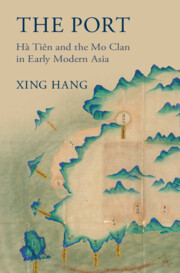
- Publisher:
- Cambridge University Press
- Online publication date:
- November 2024
- Print publication year:
- 2024
- Online ISBN:
- 9781009427005
- Subjects:
- East Asian History, Area Studies, Asian Studies, History, Economic History

The Port (present-day Hà Tiên), situated in the Mekong River Delta and Gulf of Siam littoral, was founded and governed by the Chinese creole Mo clan during the eighteenth century and prospered as a free-trade emporium in maritime East Asia. Mo Jiu and his son, Mo Tianci, maintained an independent polity through ambiguous and simultaneous allegiances to the Cochinchinese regime of southern Vietnam, Cambodia, Siam, and the Dutch East India Company. A shared value system was forged among their multiethnic and multi-confessional residents via elite Chinese culture, facilitating closer business ties to Qing China. The story of this remarkable settlement sheds light on a transitional period in East Asian history, when the dominance of the Chinese state, merchants, and immigrants gave way to firmer state boundaries in mainland Southeast Asia and Western dominance on the seas.
‘A fascinating historical exhumation of a port known to specialists, but not to the general public (though by virtue of its importance, as Xing Hang shows, it should be). A truly interesting read.’
Eric Tagliacozzo - Cornell University
‘In The Port, Xing Hang provides a tour de force history of the rise and fall of Hà Tiên, a Chinese creole frontier entrepot on the Vietnamese-Cambodian border during the seventeenth and eighteenth centuries. Based on meticulous research in multiple languages, this book adds significantly to recent scholarship on the New Qing Maritime History and the Chinese diaspora by skilfully analyzing the complex interconnectedness between Chinese officials, merchants, refugees and poets, pirates, Buddhist monks, and French Catholic priests, as well as indigenous Viet, Khmer, and Austronesian populations. The author writes in an engaging and thought-provoking style that will make this book a must read for students and scholars interested in Asian history and comparative studies.’
Robert J. Antony - Guangzhou University
‘This study of Ha Tien (in modern Vietnam) shows how the Mo clan drew on the networks of trade, ethnicity, kinship, and Chinese culture to create a cosmopolitan hub that retained its own distinct identity. It is a major contribution to our understanding of the ‘water world’ in early modern Southeast Asia.’Barbara Watson Andaya
Barbara Watson Andaya - University of Hawaiʻi at Mānoa
 Loading metrics...
Loading metrics...
* Views captured on Cambridge Core between 21st November 2024 - 18th April 2025. This data will be updated every 24 hours.
Usage data cannot currently be displayed.